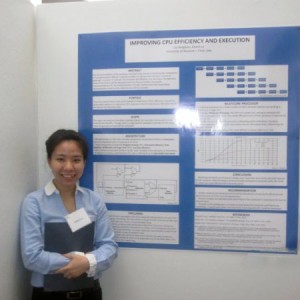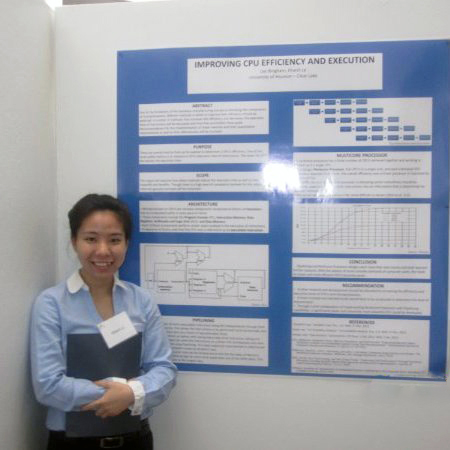UHCL undergrad student seeks to improve quality of life through brain state modeling

Khanh Le was a banking and finance graduate working at a bank in Vietnam for three years. She decided to make a life-changing decision and leave her job to pursue her degree in Computer Science. Unaware of the possibilities and her future ahead, Le was bound for Houston.
Le attended San Jacinto Community College and graduated with her associate degree in business administration. After attending an open house at UHCL in the spring of 2013, Le enrolled at the university to pursue her degree in Computer Science.
“The business environment did not work well with me; my dream job has always been a teaching job,” Le said. “I decided to come to Texas with my sister and brother-in-law to pursue another degree.”
Le joined the National Science Foundation (NSF) Scholar Organization, her first semester at the university. The NSF Scholar Organization promotes Science, Technology, Engineering and Mathematics (STEM) undergraduates in these respective fields.
In summer of 2014 she attended the Research Experience for Undergraduates (REU) program at the University of Houston-Downtown. This is an intensive 10-week summer training program where students take part in the full cycle of research activities.
Experienced researchers from the University of Texas Health Science Center at Houston participated as mentors for the program.
“Parallel Brain Wave Analysis interested me the most,” Le said “I was lucky to be accepted in the program and work with my mentor, Dr. Hong Lin, a computer science professor at UH-Downtown. He is also the best mentor I have ever had.”
During the 10-weeks of summer, Le measured the brainwaves of eight subjects and calculated statistical information. This information allowed Le to build models for different states of meditation.
“With the help of my best friend, Lee Bingham, I was able to build the models of different states of meditation,” Le said. “Our hope is to interface these models with new technology to help disabled individuals have more control and mobility.”
Le’s research is still in the validation phase, and her goal is to recognize and analyze brain states more consistently and accurately.
“We are still in the proof of concept phase, and if we can analyze brain states and validate them, we’re in a good step towards that goal,” said Lee Bingham, computer engineering major.
Lin, one of the directors of REU, nominated Le to present her research at the Hispanic Engineer National Achievement Award Corporation (HENAAC) Conference in New Orleans. Le’s presentation then led her to the REU Symposium in Arlington, Virginia Oct. 26.
“Khanh worked diligently on the project and participated actively in the entire procedure of the research, including data collection, organization, classification and modeling,” Lin said. “Her presentation reflected her accomplishment.”
Lee stated that this research will lead to building more refined models in different brain states, and she is working to interface these models to control simple electrical devices such as, turning the light on and off using only your brain.
“We are applying new analysis tools and methods to build more models,” Le said. “With the accuracy of the models of brain states built-in the future, we hope to improve the quality of life of disabled individuals.”

